Topics

Prof. Dr. Galina Kolev-Schaefer
Senior Economist
Tel: +49 221 4981-774 Mail: kolev@iwkoeln.de @galina_kolev- Born 1981 in Sofia, Bulgaria
- Studies in business administration and economics at the University of Mannheim
- Doctorate at the Economics Department of the University of Mannheim on topics of European economic and monetary integration
- Since 2012 at the IW
- 2019-2022 Professor of general economics, in particular international economic relations at RheinMain University of Applied Sciences, Wiesbaden
- Since 2022, professor of economics at the Cologne University of Technology
- Research interests: Trade policy, sustainability and climate aspects of trade policy,Transatlantic economic relations, globalization, macroeconomic analysis, sustainability and resilience of global value chains
IW Publications
Kolev-Schaefer, Galina / Neligan, Adriana, 2024, Due Diligence - Effect of Supply Chain regulation. Data-based results on the effects of the German Supply Chain Act, IW-Report, Nr. 8, Köln / Berlin
Zur Studie
Kolev-Schaefer, Galina / Obst, Thomas / Puls, Thomas, 2024, Auswirkungen des Nahostkonflikts auf die deutsche Wirtschaft, IW-Report, Nr. 1, Köln / Berlin
Zur Studie
Kolev, Galina / Neligan, Adriana, 2022, Effects of a supply chain regulation. Survey-based results on the expected effects of the German Supply Chains Act, IW-Report, Nr. 8, Köln / Berlin
Zur Studie
Kolev, Galina / Obst, Thomas, 2022, Global value chains of the EU member states. Policy options in the current debate, IW-Report, Nr. 4, Köln / Berlin
Zur Studie
(in cooperation with Sonja Jovicic)
The influence of public investment on the German current account surplus
IW-Kurzbericht 37/2019
Wahlbeteiligung in Europa
IW-Report 19/2019
(IW-Forschungsgruppe Konjunktur)
Verunsicherung schwächt die Konjunktur – IW-Konjunkturprognose und Konjunkturumfrage Frühjahr 2019
IW-Trends 2/2019
Understanding Protectionism – Empirical Analysis of Protectionist Attitudes in the EU
IW-Report 9/2019
Potenzielle Auswirkungen einer Zuspitzung des Handelsstreits – Simulations- und umfragebasierte Ergebnisse
IW-Report 1/2019
Handelsbeziehungen zwischen der EU und den USA – Pessimismus überwiegt
IW-Kurzbericht 73/2018
(IW-Forschungsgruppe Konjunktur)
IW-Konjunkturprognose Herbst 2018 – Im Sinkflug
IW-Trends 3/2018
(IW-Forschungsgruppe Konjunktur)
IW-Konjunkturprognose Frühjahr 2018 – Hohe Zuversicht der Unternehmen, hohe Risiken durch Protektionismus
IW-Trends 2/2018
(in cooperation with Alexander Burstedde, Jürgen Matthes)
Wachstumsbremse Fachkräfteengpässe
IW-Kurzbericht 27/2018
(in cooperation with Markus Demary, Michael Grömling)
Ist die deutsche Wirtschaft am Limit? Ansätze zur Bestimmung der gesamtwirtschaftlichen Kapazitätsbeanspruchung
IW-Trends 1/2018
(in cooperation with Tobias Hentze)
Gesamtwirtschaftliche Effekte einer Ausdehnung der öffentlichen Investitionen
IW policy papers 2/2018
(in cooperation with Forschungsgruppe Gesamtwirtschaftliche Analysen und Konjunktur)
IW-Konjunkturprognose Herbst 2017 – Die deutsche Konjunktur am Limit? Fachkräftemangel als Wachstumsbremse
IW-Trends 4/2017
(in cooperation with Manuel Fritsch, Jürgen Matthes)
Auch EU-Partner profitieren vom deutschen US-Exporterfolg
IW-Kurzbericht 73/2017
(in cooperation with Martin Beznoska, Jochen Pimpertz)
Makroökonomische Effekte einer paritätischen Beitragsfinanzierung – Eine Analyse aktueller Reformvorschläge für die Gesetzliche Kranken- und die soziale Pflegeversicherung
IW policy papers 11/2017
(in cooperation with Forschungsgruppe Gesamtwirtschaftliche Analysen und Konjunktur)
IW-Konjunkturprognose Frühjahr 2017: Arbeitsmarkt trägt Konjunktur – Erfolge nicht verspielen
IW-Trends 2/2017
(in cooperation with Berthold Busch)
Frankreich vor der Stichwahl
IW-Kurzbericht 35/2017
Exportüberschuss mit den USA – eine Relativierung
IW-Kurzbericht 23/2107
(in cooperation with Thomas Puls)
Trumponomics und die deutsche Autoindustrie
IW-Kurzbericht 9/2017
(in cooperation with Tobias Hentze)
Gesamtwirtschaftliche Effekte der Flüchtlingsmigration in Deutschland
IW-Trends 4/2017
(in cooperation with IW-Forschungsgruppe Konjunktur)
Eskalierende Unsicherheit lähmt Investitionen – IW-Konjunkturprognose Herbst 2016
IW-Trends 4/2016
(in cooperation with Berthold Busch, Jürgen Matthes)
Brexit-Wirkungen auf Deutschland?
IW-Kurzbericht 71/2016
Neuer Ansatz für TTIP
IW-Kurzbericht 60/2016
Ja zu Freihandel, nein zu TTIP? Die TTIP-Skepsis und ihre Ursachen
IW-Report 25/2016
(in cooperation with Judith Niehues)
Ist Ungleichheit schlecht für das Wirtschaftswachstum? – Eine Neubewertung des Zusammenhangs für Deutschland
IW-Report 14/2016
(in cooperation with IW-Forschungsgruppe Konjunktur)
Vordergründig robust, hintergründig anfällig – IW-Konjunkturprognose Frühjahr 2016
IW-Trends 2/2016
(in cooperation with Roman Bertenrath, Roman Bertenrath, Vera Demary, Manuel Fritsch, Michael Grömling, Hans-Peter Klös, Rolf Kroker, Karl Lichtblau, Jürgen Matthes, Agnes Millack, Axel Plünnecke, Oliver Stettes)
Wohlstand in der digitalen Welt – Erster IW-Strukturbericht
IW-Studie, 2016
Strukturelle Schwächen der russischen Wirtschaft
IW-Report 3/2016
(in cooperation with IW-Forschungsgruppe Konjunktur)
Moderate Schlagzahl im Fahrwasser der schwächeren Weltwirtschaft – IW-Konjunkturprognose Herbst 2015
IW-Trends 4/2015
(in cooperation with IW-Forschungsgruppe Konjunktur)
Neue Herausforderungen – Konjunkturelle Fragen im Herbst 2015
Fragen und Antworten, 2015
(in cooperation with IW-Forschungsgruppe Konjunktur)
Deutsche Konjunktur im Zeichen billigen Öls und billigen Geldes
IW-Trends 2/2015
TTIP – Challenges and Opportunities for the European Automotive Industry
IW policy papers 28/2015
(in cooperation with IW-Forschungsgruppe Konjunktur)
Die deutsche Wirtschaft im Stop-and-go-Modus – IW-Konjunkturprognose Herbst 2014
IW-Trends 3/2014
TTIP – Mehr als Handelsliberalisierung
IW policy papers 11/2014
(in cooperation with IW-Forschungsgruppe Konjunktur)
Überschaubare Erholung in einem risikoreichen globalen Umfeld – IW-Konjunkturprognose Frühjahr 2014
IW-Trends 1/2014
(in cooperation with IW-Forschungsgruppe Konjunktur)
Auftrieb mit wenig Rückenwind – IW-Konjunkturprognose Herbst 2013
IW-Trends 3/2013
(in cooperation with Jürgen Matthes)
Smart Fiscal Consolidation – Wie Konsolidierung gelingen und möglichst wachstumsfreundlich sein kann
IW policy paper 17/2013
(in cooperation with Jürgen Matthes)
Die wirtschaftlichen Verflechtungen zwischen Deutschland und der EU
Institut der deutschen Wirtschaft Köln (Hrsg.): Die Zukunft der Industrie in Deutschland und Europa, IW-Analysen, Nr. 88, Köln, S. 53–68
(in cooperation with IW-Forschungsgruppe Konjunktur)
Erholung ohne Schwung – IW-Konjunkturprognose Frühjahr 2013
IW-Trends 2/2013
(in cooperation with IW-Forschungsgruppe Konjunktur)
Staatsschuldenkrise bremst deutsche Wirtschafts aus – IW-Konjunkturprognose Herbst 2012
IW-Trends 3/2012
Expertises
Kolev, Galina, 2021, The transatlantic economic relations and their outstanding significance for the future of the European and the German economy, Gutachten im Auftrag von Atlantik-Brücke, Köln
Zur Studie
Hentze, Tobias / Kolev, Galina, 2021, Wirtschaftliche Effekte des BDI-Steuermodells der Zukunft, Gutachten im Auftrag des Bundesverbands der Deutschen Industrie e. V. (BDI), Köln
Zur Studie
(in cooperation with Thorsten Lang, Michael Grömling)
Produktivitätswachstum in Deutschland
Gutachten für den Bundesverband der Deutschen Industrie e.V. (BDI), 2019
(in cooperation with Jürgen Matthes)
The Transatlantic Trade and investment Partnership (TTIP): Challenges and Opportunities for the Internal Market and Consumer Protection in the Area of Motor Vehicles
STUDY for the IMCO Committee, 2015
(in cooperation with Michael Grömling, Jürgen Matthes)
Auswirkungen des Energiepreisverfalls auf den deutschen Außenhandel
Gutachten für den Aussenhandelsverband für Mineralöl und Energie und für die Mittelständische Energiewirtschaft Deutschland, 2015
(in cooperation with Cornelius Bähr, Roman Bertenrath, Jürgen Matthes)
Freihandelsabkommen USA-EU: Herausforderungen für die bayerischen Unternehmen
Gutachten für VBW, 2014
Zunehmende Verflechtung mit dem Wachstumsmarkt Asien – Die Finanzwirtschaft folgt der Realwirtschaft
Gutachten für die Deutsche Börse
External Publications
Zukunftsinvestitionen und verlässlicher wirtschaftspolitischer Kurs statt Konjunkturpolitik
Wirtschaftsdienst, 99. Jg., Nr. 11, S. 761–764
Protectionism or Free Trade? Or Both? Analysis of Protectionism Attitudes in the EU
INFER Working Paper, Nr. 2019.04
(in cooperation with Stephan Mühlbaur und Stefanie Schick)
Das Exportjahr 2019
Pro Management Verlag, Augsburg, 2019
(in cooperation with Judith Niehues)
Ungleichheit und Wirtschaftswachstum – ein nicht-linearer Zusammenhang
ifo Schnelldienst, 71. Jg., Nr. 15, 2018, S. 6–9
Protectionism is the wrong medicine
AICGS Essay, 2018
Das Exportjahr 2018: Außenwirtschaftlicher Ausblick 2018; Entwicklung der Exportregionen; Export-, Import- und Zollbestimmungen-Veränderungen 2018
Pro Management Verlag, Augsburg, 2018
(in cooperation with Stefanie Gailler und Stephan Mühlbaur)
The European Integration and its International Dimension: An Introduction
European Journal of Comparative Economics, 14. Jg., Nr. 2, 2017, S. 157–161
Der transatlantische Handel als tragende Säule und Gefahr für die deutsch-amerikanischen Wirtschaftsbeziehungen
ifo Schnelldienst, 70. Jg., Nr. 14, 2017, S. 15–18
Why TTIP might be good (or bad) for Germany?
Maria Dunin-Wąsowicz, TTIP in Retreat? Evaluating the Strategic Significance of Transatlantic Free Trade, 2017, S. 70–75
(in cooperation with Berthold Busch und Jürgen Matthes)
Auswirkungen des Brexits auf das UK und auf Deutschland
List Forum für Wirtschafts- und Finanzpolitik, Online-Version, 2017
(in cooperation with Stefanie Gailler und Stephan Mühlbaur)
Das Exportjahr 2017
Pro Management Verlag, Augsburg, 2017
Türkei: Scheinstabilität und Strukturprobleme, zur Diskussion gestellt
ifo Schnelldienst, 69. Jg., Nr. 21, 2016
Strukturelle Schwäche der russischen Wirtschaft
Wirtschaftsdienst, 96. Jg., Nr. 5, 2016, S. 357–363
(in cooperation with Jürgen Matthes)
Ein differenzierter Blick auf die kontroverse TTIP-Debatte
Wirtschaftsdienst, 96. Jg., Nr. 3, 2016, S. 159–163
(in cooperation with Stefanie Gailler und Stephan Mühlbaur)
Das Exportjahr 2016
Pro Management Verlag, Augsburg, 2016
(in cooperation with Jürgen Matthes)
TTIP: effects on the automotive industry
Intereconomics, 50. Jg., Nr. 6, 2015, S. 337–343
On the nature of shocks driving exchange rates in emerging economies
FIW Working Paper, Nr. 146, 2015
(in cooperation with Stefanie Gailler und Stephan Mühlbaur)
Das Exportjahr 2015
Pro Management Verlag, Augsburg, 2015
(in cooperation with Stefanie Gailler und Stephan Mühlbaur)
Das Exportjahr 2014
Pro Management Verlag, Augsburg, 2014
(in cooperation with Jürgen Matthes)
Going for growth: Smart Fiscal Consolidation - A strategy to achieving sustainable public finances and growth
CES Research Paper, Juli, 2013
Quo vadis Eurozone? A reappraisal of the real exchange rate criterion
Beiträge zur Jahrestagung des Vereins für Socialpolitik 2012: Neue Wege und Herausforderungen für den Arbeitsmarkt des 21. Jahrhunderts, 2012
(in cooperation with Roland Vaubel)
Did the Bundesbank target monetary expansion or inflation? Evidence from monetary base growth
Swiss Journal of Economics and Statistics, 148. Jg., Nr. III, 2012, S. 439–447
Explanations for the Real Exchange Rate Development in the New EU Member States in Transition
BNB Discussion Paper, Nr. 78, 2009
More from Prof. Dr. Galina Kolev-Schaefer

Due Diligence - Effect of Supply Chain regulation: Data-based results on the effects of the German Supply Chain Act
After the agreement of the European Parliament and the Council of the EU in December 2023, a few formal steps remain to introduce the Corporate Sustainability Due Diligence Directive (CSDDD).
IW
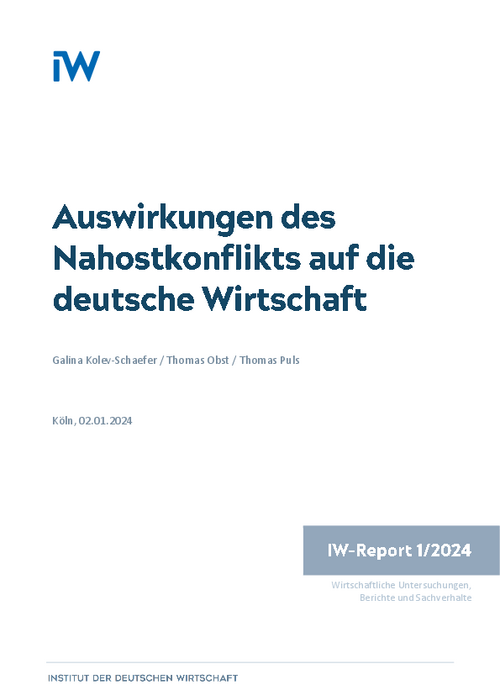
Effects of the Middle East conflict on the German economy
Beyond the humanitarian crisis associated with the geopolitical conflict in Israel, which affects millions of human lives, the Middle East conflict also leaves lasting marks on economic activity not only in the affected region, but also in Germany and the world as a whole. This report discusses the various ways in which the conflict is impacting the German economy.
IW
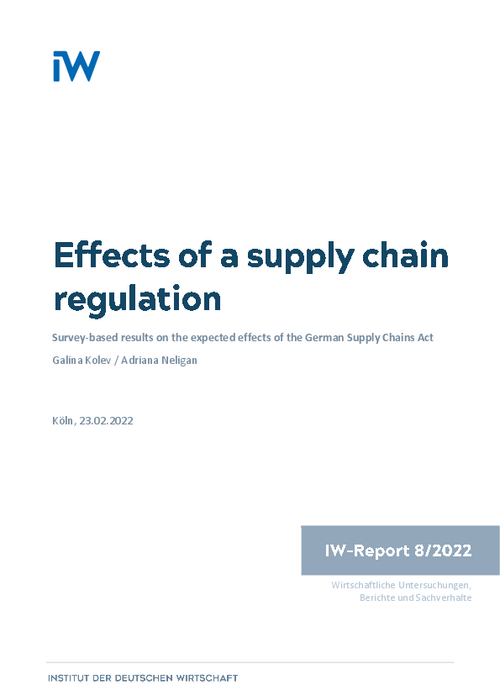
Effects of a supply chain regulation
The European Commission is planning a new regulation for mandatory human rights and environmental due diligence (Due Diligence Directive) as part of the Sustainable Corporate Governance initiative. The long-awaited EU proposal is expected to have requirements that go far beyond the German Act on Due Diligence in Supply Chains (the so-called Lieferkettensorgfaltspflichtengesetz), which was regarded as a possible blueprint for a European solution. The present paper contributes to the debate on an EU due diligence regulation by presenting results of a recent survey conducted by the German Economic Institute (IW) on the potential impact of the already adopted German Act on Due Diligence in Supply Chains.
IW
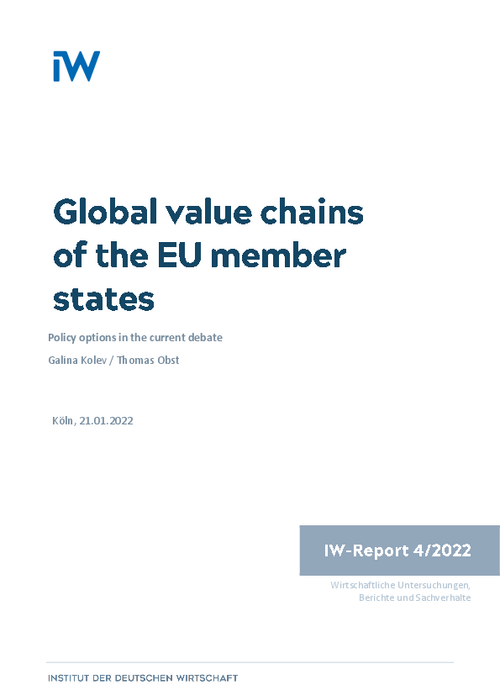
Global value chains of the EU member states: Policy options in the current debate
In 2020, EU companies imported intermediate products worth 2.4 trillion euros, which made up more than half of total merchandise imports of the EU. Compared to the pre-crisis year 2019, imports of intermediates decreased by 13 percent, partly driven by the lower fuel prices.
IW

The transatlantic economic relations and their outstanding significance for the future of the European and the German economy
The EU and the US remain each other’s most important economic partners, despite the con-frontative course of the Trump administration and China’s rise as a global economic power. This is particularly the case as interconnectedness and the role of foreign affiliates in exchanging know-how and services have been gaining importance as the very fundamentals of future globalization.
IW

Economic Effects of the BDI tax model for the future
In international comparison, Germany is a high-tax country. Since the corporate tax reform in 2008, the burden has increased while many other countries have lowered tax rates.
IW
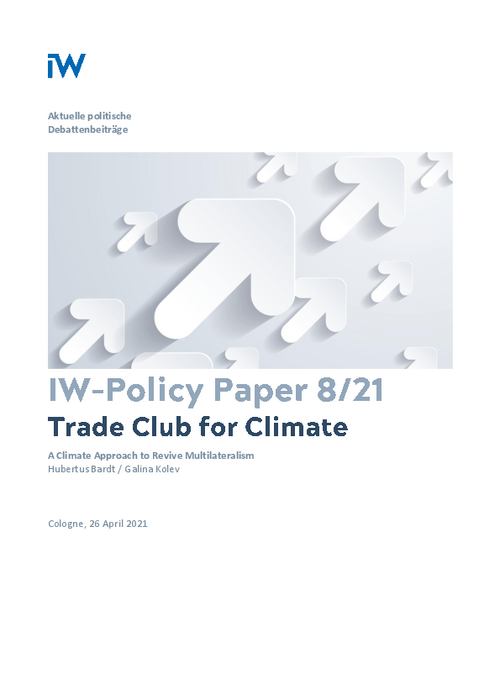
Trade Club for Climate
A trade policy approach to climate challenges can give a positive impetus to WTO reform based on the commitment to a common target and reinforced by the urgency of that target.
IW
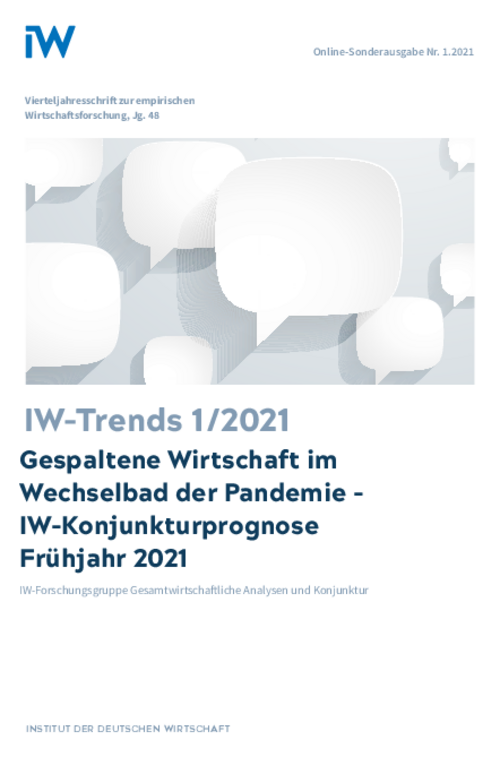
IW Economic Forecast Spring 2021: Pandemic Sends a Divided Economy on a Rollercoaster Ride
The German economy is divided on both the supply and demand sides. Consumption and parts of the service economy are again experiencing sharp falls while exports and some industrial sectors are benefiting from a worldwide economic recovery.
IW
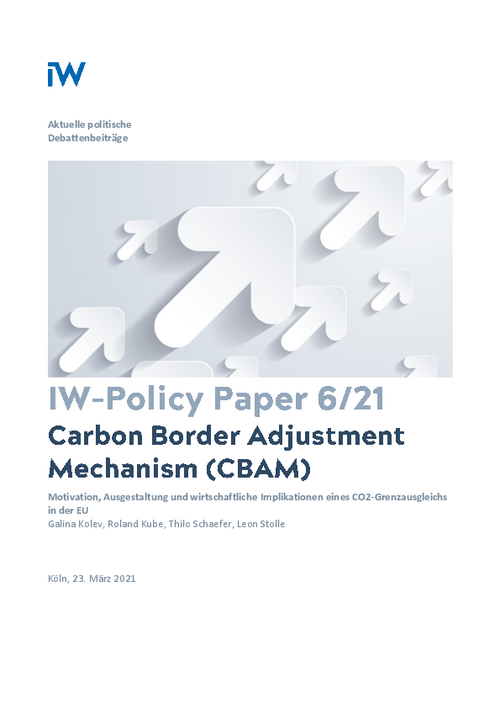
Motivation, Design and Economic Implications of a CO2 Limit Offset in the EU
The European Green Deal stipulates an increase in the emissions reduction target for 2030 from 40 to 55 percent compared with the base year 1990. This also requires the ramp-up of extensive technology investments for a decarbonization pathway for industry, which tends to entail higher abatement costs.
IW
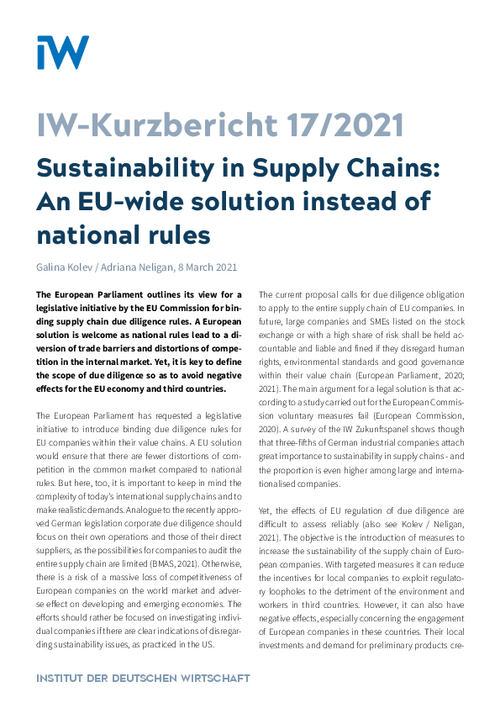
Sustainability in Supply Chains: An EU-wide Solution Instead of National Rules
The European Parliament outlines its view for a legislative initiative by the EU Commission for binding supply chain due diligence rules. A European solution is welcome as national rules lead to a diversion of trade barriers and distortions of competition in the internal market. Yet, it is key to define the scope of due diligence so as to avoid negative effects for the EU economy and third countries.
IW